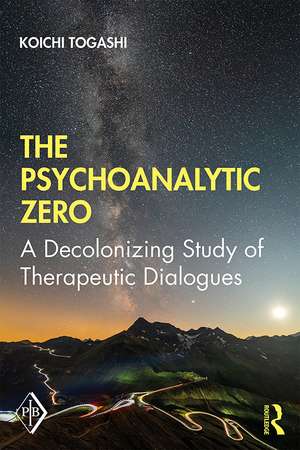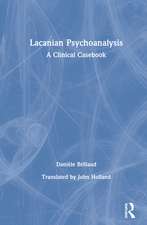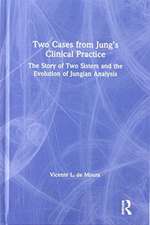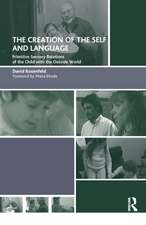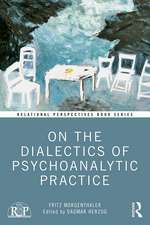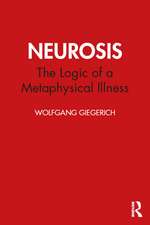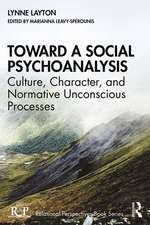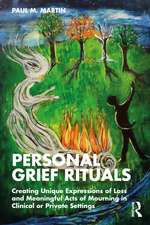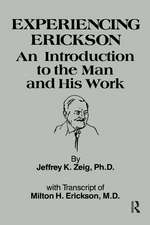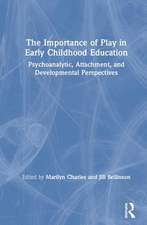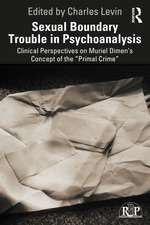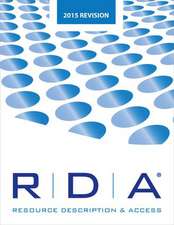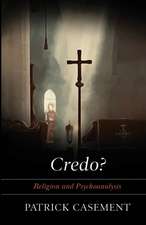The Psychoanalytic Zero: A Decolonizing Study of Therapeutic Dialogues: Psychoanalytic Inquiry Book Series
Autor Koichi Togashien Limba Engleză Paperback – 20 feb 2020
The Psychoanalytic Zero: A Decolonizing Study of Therapeutic Dialogues is written from the unique perspective of a Western-trained Asian psychoanalyst and applies principles of Eastern philosophy to understand the psychoanalytic relationship, psychoanalytic processes, and their uses - and limitations - for alleviating human suffering.
Bringing a unique Eastern perspective to a previously Western-dominated discipline and framed within the current relational and ethical trends in psychoanalysis, the book enables readers to develop a language for understanding an Eastern ethical viewpoint and explore how this language can change our awareness of psychoanalytic practice and human suffering. Chapters are devoted to the Eastern concepts of nothingness, emptiness, surrender, sincerity, silence and narrative, and issues including existential 'guilt of being, ' trauma, contingency, informed consent, the sense of being human, and uncertainty. Discussions are illustrated and illuminated through vivid recreations and careful elaboration of therapeutic case studies with traumatized patients. The studies demonstrate the process by which patients regain a sense of being human. This enriched perspective will, it is hoped, help the analyst treat traumatized patients who are unable to relate to others, and who do not experience themselves as being human.
The Psychoanalytic Zero will enrich an analyst's sensitivity to the appearance of the moment without context - the psychoanalytic zero - which opens infinite opportunities for continued growth in a psychoanalytic relationship. It will be of great appeal to psychoanalysts and psychoanalytic psychotherapists interested in self-psychological, intersubjective, and relational theories.
| Toate formatele și edițiile | Preț | Express |
|---|---|---|
| Paperback (1) | 329.27 lei 6-8 săpt. | |
| Taylor & Francis – 20 feb 2020 | 329.27 lei 6-8 săpt. | |
| Hardback (1) | 825.89 lei 6-8 săpt. | |
| Taylor & Francis – 12 feb 2020 | 825.89 lei 6-8 săpt. |
Din seria Psychoanalytic Inquiry Book Series
- 5%
 Preț: 212.85 lei
Preț: 212.85 lei - 5%
 Preț: 316.42 lei
Preț: 316.42 lei - 5%
 Preț: 232.72 lei
Preț: 232.72 lei - 5%
 Preț: 265.58 lei
Preț: 265.58 lei - 5%
 Preț: 372.72 lei
Preț: 372.72 lei - 5%
 Preț: 440.11 lei
Preț: 440.11 lei - 5%
 Preț: 316.00 lei
Preț: 316.00 lei - 5%
 Preț: 202.90 lei
Preț: 202.90 lei - 5%
 Preț: 232.28 lei
Preț: 232.28 lei - 5%
 Preț: 201.63 lei
Preț: 201.63 lei - 20%
 Preț: 334.13 lei
Preț: 334.13 lei - 5%
 Preț: 360.54 lei
Preț: 360.54 lei - 5%
 Preț: 1409.03 lei
Preț: 1409.03 lei - 5%
 Preț: 395.10 lei
Preț: 395.10 lei - 5%
 Preț: 381.65 lei
Preț: 381.65 lei - 5%
 Preț: 382.02 lei
Preț: 382.02 lei - 5%
 Preț: 450.95 lei
Preț: 450.95 lei - 5%
 Preț: 327.41 lei
Preț: 327.41 lei -
 Preț: 345.63 lei
Preț: 345.63 lei - 5%
 Preț: 1475.22 lei
Preț: 1475.22 lei - 5%
 Preț: 1412.13 lei
Preț: 1412.13 lei - 5%
 Preț: 381.61 lei
Preț: 381.61 lei - 15%
 Preț: 301.62 lei
Preț: 301.62 lei -
 Preț: 423.58 lei
Preț: 423.58 lei - 5%
 Preț: 377.98 lei
Preț: 377.98 lei - 11%
 Preț: 278.48 lei
Preț: 278.48 lei - 5%
 Preț: 399.13 lei
Preț: 399.13 lei - 5%
 Preț: 396.03 lei
Preț: 396.03 lei - 5%
 Preț: 378.88 lei
Preț: 378.88 lei - 5%
 Preț: 459.07 lei
Preț: 459.07 lei - 5%
 Preț: 326.58 lei
Preț: 326.58 lei - 5%
 Preț: 375.25 lei
Preț: 375.25 lei - 5%
 Preț: 1089.35 lei
Preț: 1089.35 lei -
 Preț: 438.48 lei
Preț: 438.48 lei - 5%
 Preț: 361.70 lei
Preț: 361.70 lei - 5%
 Preț: 1096.68 lei
Preț: 1096.68 lei - 5%
 Preț: 348.73 lei
Preț: 348.73 lei
Preț: 329.27 lei
Preț vechi: 346.59 lei
-5% Nou
63.01€ • 67.38$ • 52.53£
Carte tipărită la comandă
Livrare economică 17 aprilie-01 mai
Specificații
ISBN-10: 0367859378
Pagini: 156
Ilustrații: 1 Line drawings, black and white
Dimensiuni: 156 x 234 x 20 mm
Greutate: 0.23 kg
Ediția:1
Editura: Taylor & Francis
Colecția Routledge
Seria Psychoanalytic Inquiry Book Series
Locul publicării:Oxford, United Kingdom
Public țintă
Postgraduate, Professional, and Professional Practice & DevelopmentCuprins
Notă biografică
Recenzii
"A thoughtful and challenging voice from Japan, Koichi Togashi provides a fundamental alternative to the Western presumptions of traditional psychoanalysis. Illustrating his perspective with wonderful clinical storytelling, he invites us to "decolonize" psychoanalysis and open ourselves to the challenges of emptiness. This book is for therapists and students ready to ask big questions, and keeps us absorbed. A true gift from the East." --Donna M. Orange, New York University Postdoctoral Program in Psychoanalysis and Psychotherapy, author, Psychoanalysis, History, and Radical Ethics: Learning to Hear
"By refocusing our vision eastward toward Asia, Koichi Togashi brings a fresh and thoroughly innovative perspective to many aspects of the psychoanalytic situation. Starting with the premise that "being precedes awareness" he shows how "the psychoanalytic zero" which has its roots in the Heart Sutra of Mayahana Buddhism as well as Taoism, decenters psychoanalysis from the iron grip of Western thought and values. Togashi confronts the reader with the startling awareness that such familiar topics as trauma, guilt and responsibility take on new meaning when viewed through an Eastern lens. But perhaps even more importantly, reading this book allows the reader to find new answers to questions about what it means to be human." --Doris Brothers, co-founder of The Training and Research in Intersubjective Self Psychology Foundation, advisory board and council of the IAPSP
Descriere
The Psychoanalytic Zero: A Decolonizing Study of Therapeutic Dialogues is written from the unique perspective of a Western-trained Asian psychoanalyst and applies principles of Eastern philosophy to understand the psychoanalytic relationship, psychoanalytic processes, and their uses - and limitations - for alleviating human suffering.
Bringing a unique Eastern perspective to a previously Western-dominated discipline and framed within the current relational and ethical trends in psychoanalysis, the book enables readers to develop a language for understanding an Eastern ethical viewpoint and explore how this language can change our awareness of psychoanalytic practice and human suffering. Chapters are devoted to the Eastern concepts of nothingness, emptiness, surrender, sincerity, silence and narrative, and issues including existential 'guilt of being, ' trauma, contingency, informed consent, the sense of being human, and uncertainty. Discussions are illustrated and illuminated through vivid recreations and careful elaboration of therapeutic case studies with traumatized patients. The studies demonstrate the process by which patients regain a sense of being human. This enriched perspective will, it is hoped, help the analyst treat traumatized patients who are unable to relate to others, and who do not experience themselves as being human.
The Psychoanalytic Zero will enrich an analyst's sensitivity to the appearance of the moment without context - the psychoanalytic zero - which opens infinite opportunities for continued growth in a psychoanalytic relationship. It will be of great appeal to psychoanalysts and psychoanalytic psychotherapists interested in self-psychological, intersubjective, and relational theories.
